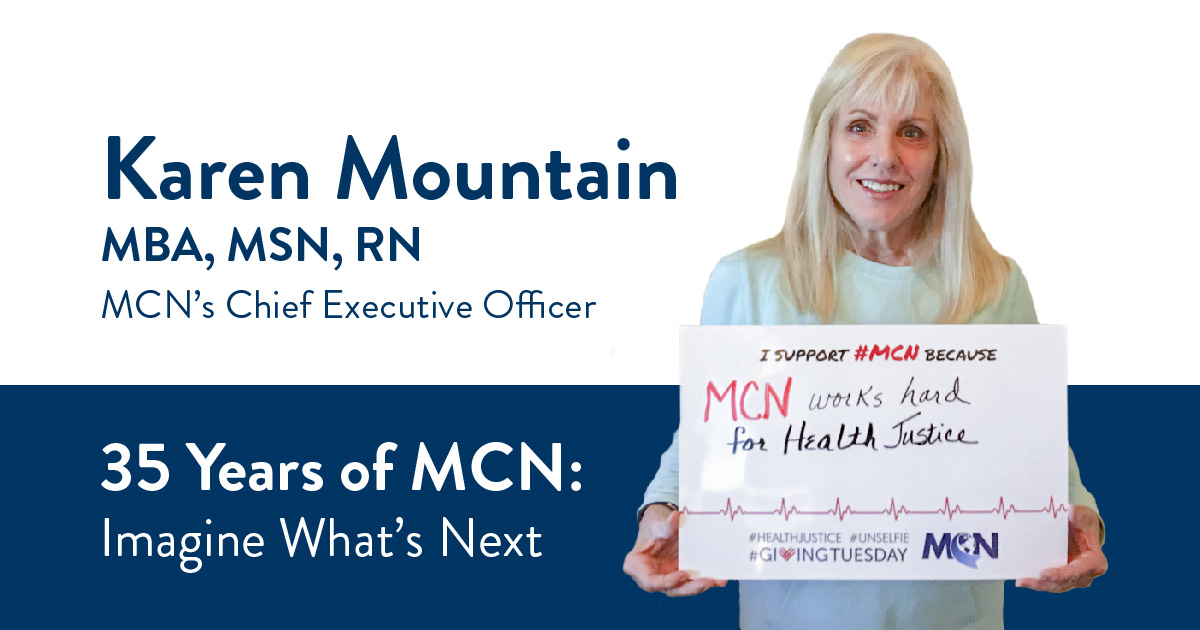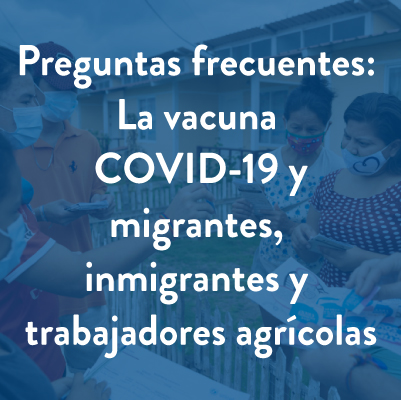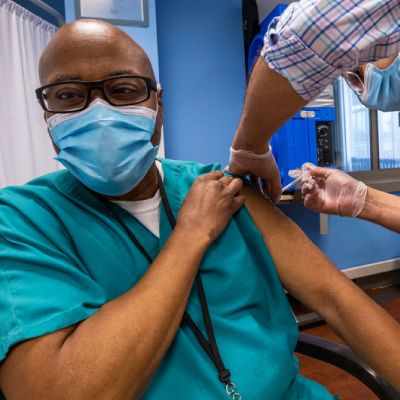- Who We Are
- Clinician Employment
- Publications
- Witness to Witness (W2W)
- El Premio Kugel & Zuroweste a la Justicia en la Salud
- Your Voice Matters: Photovoice Project
Wed, 07/24/2019 | by Claire Hutkins Seda


“I always knew I wanted to go into health care,” says Karen Mountain, MBA, MSN, RN, Migrant Clinicians Network’s Chief Executive Officer, the first and only leader that MCN has had since its inception, 35 years ago. Mountain’s early endeavors as an adventurous international nurse gave her a global perspective and a desire to support health care delivery at the international level. But it was her upbringing that started her early love of medicine.
Her father was a surgeon. “On weekends and during the summer, I would get to go stand in the corner of the operating room and watch him operate,” she recalled. At age 11, she was watching six-hour surgeries. She was fascinated -- and her career path was solidified. She originally thought she’d go into medicine, but she was pulled to nursing.
“Through nursing school, I was intrigued with working trauma,” she recalled, which led after graduation to a five-year stint in a trauma center. “That’s a really hard job and you burn out,” she admitted, but it led her to her next step: “I wanted to design systems and support health care delivery systems.” She became a program director at the Texas Office of Rural Health, wherein she drove to the many rural corners of Texas in a pickup truck attempting to help connect residents to the health services they needed. At this time, she also volunteered for the first shelter for victims and survivors of intimate partner violence in Austin. She then did some stints internationally.
At the time, Guatemala and Mexico were in conflict over a plan to dam the Usumacinta River, which would have significant impact on communities near the river. National Geographic sent its senior photographers to do a photographic survey of two sites under threat -- and they needed a nurse. “Basically, they hired me because I could kayak and I treated snakebites,” Mountain laughed. She put together a transport system from the jungle out to medical facilities, should a photographer need it; the trip would take five days.
From the tropics, she headed north of the Arctic Circle, to Utqiagvik, Alaska, then called Barrow, one of the northernmost towns in the world. There, Mountain set up transport systems for health emergencies from small rural areas outside of Utqiagvik to the town and on to Fairbanks. “Essentially, what we did was put together Community Health Workers and give them basic equipment for stabilization and transport, so they could get [patients] to Barrow,” she recalled.
She also worked in Thailand with the Friends Services Committee, where she helped set up a women’s shelter, which still exists today. The shelter cared for many women who were “Amerasian babies”, born during the Vietnam War, and were largely rejected from Vietnamese society. “Many of them were sold into prostitution, and were physically and sexually abused,” she said. After its launch, she continued on as a consultant, following their progress. “They needed to give these women some sort of work,” she said. “If they got into the shelter, they could never get out because they couldn’t support themselves.” Mountain discovered that the country suffered a high incidence of drowning due to a lack of swimming instruction. There was also high demand for truck drivers. She arranged training opportunities for women to become swim instructors and truck drivers, providing stable employment and helping women reintegrate into society; she says these initiatives were still active, decades later.
“All of this international work led me to want to work, not just at the state level, but to really work at the national and international level in support of health care delivery systems and clinicians, and to work in primary care,” Mountain said. She interviewed with Bobbi Ryder at the National Center for Farmworker Health, when the primordial MCN was a small program of NCFH.
“There was such a need and such enthusiasm from the clinicians, because at that point, they were treating people who were really misunderstood,” Mountain said. “There was a lot of blaming of the patients at that point.” In 1992, MCN was spun into an independent nonprofit, receiving its own 501(c)3 designation and establishing its first Board of Directors. Mountain was the only employee. In the first few years, she hired Elaine Penn, although Deliana Garcia, who was hired third, was already working with MCN when it was a program of NCFH, where she was still working, so “second-hire” status may be disputable. Jillian Hopewell was hired; Ed Zuroweste, MD, who later became a staff member was volunteering from the beginning. Amy Liebman was hired as a contractor early on, as well. Many of the earliest of MCN staff are still working at MCN actively committed to our mission, which speaks to Mountain’s effective leadership in the intervening decades.
“I’ve had the good fortune to find people with passion and fortitude. There’s such a spark among the people at MCN, and they just attract good people,” Mountain explained. MCN’s dedication to innovation is also a draw. “If you’ve got a decent idea and you want to do it, then we’re game for you to try. There’s so much need, and so many potential opportunities for innovation, that it’s crazy not to try.”
Mountain is a regular vocal advocate of failure, which she believes is a necessary learning tool. “We have tried and failed our share of times, but I think we learn as an organization and as individuals more from failures than from successes in many ways,” she said. “Painful as they have been, they have been so instructive!” She points to Health Network as an example of where assumptions didn’t meet reality -- but result in stronger programs. “Health Network was to be a short-term program until there was sufficient connectivity; technology would catch up and people would just exchange medical records and the problem would be solved,” Mountain said. “What we found is that the personal touch is the essential ingredient to Health Network,” making it more effective than simple records transfer. As a result, she says, it will probably never outrun its usefulness.
Mountain believes MCN’s work is more relevant than ever. “I think MCN is at a place where we have the potential for growth. Certainly, there’s the need for the organization to grow in terms of its impact.” As for her own career, Mountain is thrilled to be able to bring MCN along this journey.
“I never thought I’d spend the bulk of my career doing this work; I have had opportunities to do other work but none of the opportunities have been things that compelled me to leave because being here is such a challenge and an honor,” Mountain said. “It’s been a wonderful ride.”
Like what you see? Amplify our collective voice with a contribution.
Got some good news to share? Contact us on our social media pages above.
Return to the main blog page or sign up for blog updates here.








Comments
Karen Mountain and MCN
Thank you Karen Mountain for your incredible leadership and remarkable contribution to migrant worker health, especially here in Canda. As a health care provider, an occupational health professional and a nurse, we have relied on support materials as well as individual consultation with many folks within MCN to guide us and inform our work here in Canada, particularly in Ontario but also have seen the impact across the country; and internationally.Thank you. Thank you!Michelle Tew